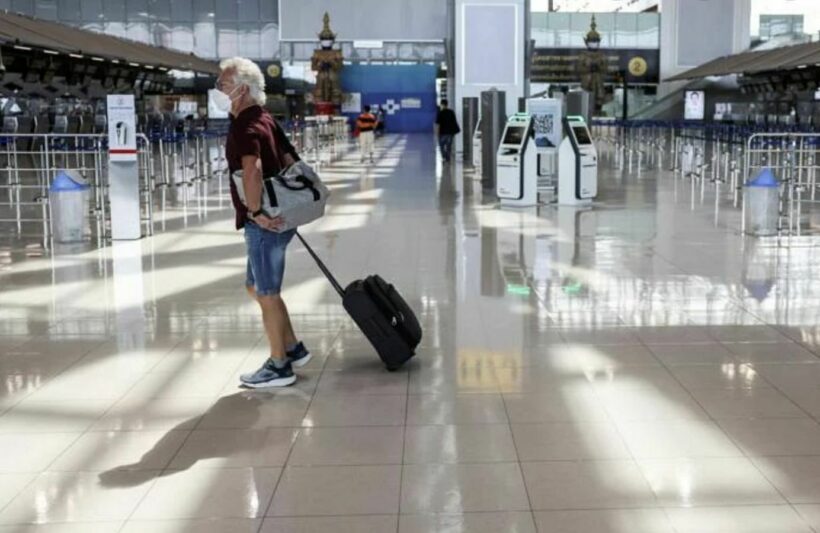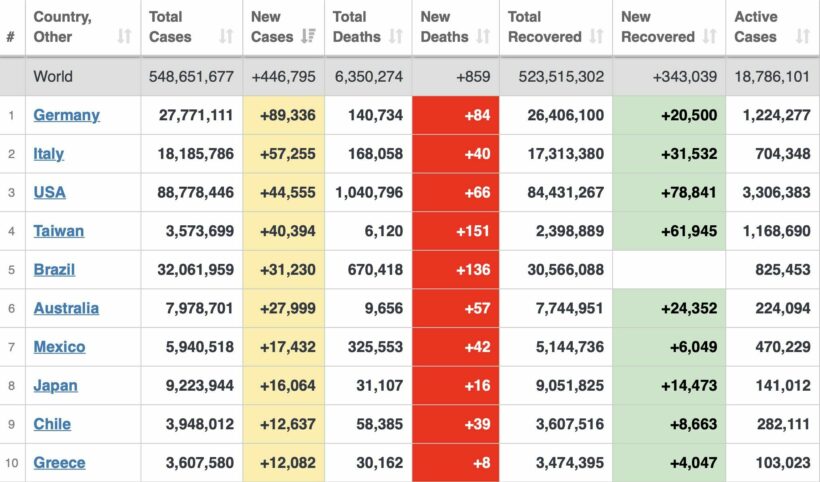Thai health officials ‘concerned’ about the international rise of Omicron BA4 and BA5 variants

Thailand health officials are expected to gather more data in the coming weeks as the highly transmissible BA.4 and BA.5 sub-variants of Omicron spread in Thailand.
There is a new wave of BA.4 and BA.5 Omicron sub-variant infections hitting a number of countries that had, until recently, seen a large drop in their Covid case loads. Germany, Italy, Australia, Taiwan, Brazil, the UK, Mexico, the US (but mostly in Florida, Texas, and New York at this time), Chile, and Greece are some of the countries which have seen sudden spikes and rises in hospital admissions. South Africa and Portugal both had sudden spikes of the new sub-variant and are now in the decline phase.
The UK, for example, now going through what it describes as its third major wave of Covid-19 infections over the past 6 months. An estimated 1.7 million people in the UK were infected in the 7 days leading up to June 18, a 23% rise on the week before and a 43% jump from the previous week. With people out and about for the region’s summer, medical authorities in the UK are concerned about how the current highly transmissible variant will roll out.
In Bangkok, the number of patients confirmed with Covid-19 after being admitted to the Siriraj Hospital, Thailand’s oldest teaching hospital, for treatment has been rising steadily over the past month but the hospital notes that Covid-19 patients with acute symptoms are not increasing at the same rate at this time. Most of the patients were detected with Covid during routine pre-treatment testing for other situations when they were admitted.
Hospital administrators admit they are getting ready for a further rise in cases over the next few weeks.
Thai health authorities say that the highly transmissible BA.4 and BA.5 sub-variants are now spreading in Thailand but the ‘wave’ is behind the timing in other countries, much like the original Omicron wave in Thailand which was around 2 months behind many other countries. The WHO says that the new strains have been spreading around Europe and the UK for “several months”.

GRAPH: Today’s top 10 countries, according to newly reported cases – worldometers.info
European health authorities report that new cases of BA.4 and BA.5 are replacing the earlier BA.2 sub-variant as the dominant Omicron variants. They concur that there is currently insufficient evidence as to whether the new strains are more virulent than the earlier Omicron strains.
Dr Prasit Watanapa, the dean of the Faculty of Medicine at Siriraj Hospital, says that a recent study by the Ministry of Public Health found a third booster shot helps “cut the risk of Covid-19 infection by 30%, while a fourth booster shot cut the risk by 70% to 75%”. The study involved more than 500,000 people.
“Wearing face masks, social distancing, and washing hands are still necessary for everyone to protect themselves from getting the coronavirus, no matter which sub-variant it is”, he told the Bangkok Post.
“Long Covid is real and may strike any infected patients regardless of what sub-variant they have”.
Thailand has recently allowed people to voluntarily wear their masks in open or public spaces since last Thursday but is still urging people to wear a mask when in crowded places. It is still a requirement to wear face masks in government buildings (including airports) and on public transport. Most private businesses are also still maintaining a mask policy within their premises at this time.
Back in Europe and the UK, doctors are noting a rise in flu cases, mostly Influenza A, which is much higher than the annual average, causing concern for the onset of the next northern hemisphere winter.
SOURCES: Bangkok Post | Dr. John Campbell | DW
Latest Thailand News
Follow The Thaiger on Google News:


























